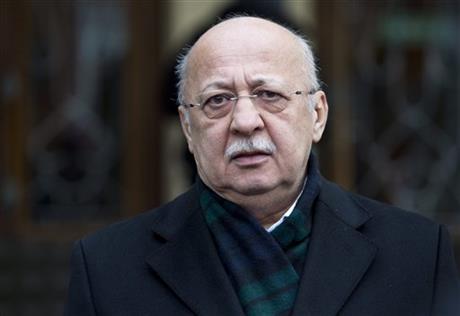
By NATALIYA VASILYEVA
Former Bolshoi chief Anatoly Iksanov speaks to press outside a Moscow court Wednesday, Nov. 20, 2013 where he arrived to testify in a case against the ballet star charged in the Jan. 17, 2013, acid attack against the chief of the Bolshoi ballet company, Sergei Filin. Former Bolshoi chief Anatoly Iksanov and former principal dancer Nikolai Tsiskaridze, arch-rivals who fueled openly about the direction of the theater, were ousted from their positions in the summer. (AP Photo/Pavel Golovkin)
Anatoly Iksanov
Former Bolshoi chief Anatoly Iksanov walks to testify at a Moscow court Wednesday, Nov. 20, 2013 in the case against the ballet star charged in the Jan. 17, 2013, acid attack against the chief of the Bolshoi ballet company Sergei Filin. Former Bolshoi chief Anatoly Iksanov and former principal dancer Nikolai Tsiskaridze, arch-rivals who fueled openly about the direction of the theater, were ousted from their positions in the summer. (AP Photo/Pavel Golovkin)
Prev
1 of 2
Next
MOSCOW (AP) — There were simmering tensions between Bolshoi ballet chief Sergei Filin and dancer Pavel Dmitrichenko, who is suspected of masterminding an acid attack on Filin, the ousted head of the famed theater told a Russian court on Wednesday.
Filin lost most of the sight in one eye and 20 percent in the other when an assailant threw acid in his face as he returned home on Jan. 17. Former ballet star Dmitrichenko is on trial for allegedly organizing the attack, along with ex-convict Yuri Zarutsky, who is suspected of carrying out the attack.
Dmitrichenko had claimed he was passed over for the best parts in the theater.
The attack shed light on fierce backstage drama at the famed Russian company and led to a major shake-up. Director general Anatoly Iksanov and his archrival, former principal dancer Nikolai Tsiskaridze, who feuded openly about the direction of the theater, were both ousted.
Iksanov told the court he was aware of a “difficult relationship” between Filin and Dmitrichenko but never personally witnessed any animosity. He said employees had told him that Dmitrichenko “took liberties in speaking rudely” to Filin before others.
Looking straight at Dmitrichenko, Iksanov dismissed the dancer’s claims that Filin had threatened staff and even extorted $100,000 from the troupe chief.
“I’m confident that this could not have happened,” Iksanov said.
Dmitrichenko, in his questions to Iksanov, tried to claim that a regular dancer like him could never undermine a boss like Filin. Iksanov disagreed, saying “it was possible to create unbearable conditions” for Filin to work.
Although Dmitrichenko and Iksanov seemed to disagree on what was fueling tensions, both looked amicable and were smiling at each other like old friends.
In his court testimony earlier this month, Filin called Dmitrichenko a volatile and threatening employee who was always stirring up trouble, but stopped short of accusing him of plotting the attack.
The star dancer has pleaded not guilty but has admitted “moral responsibility” for what happened to the ballet chief because he spoke badly of Filin in front of Zarutsky.
Dmitrichenko and Zarutsky could face 12 years in prison if convicted of collusion, but that figure could drop if they are sentenced individually.



